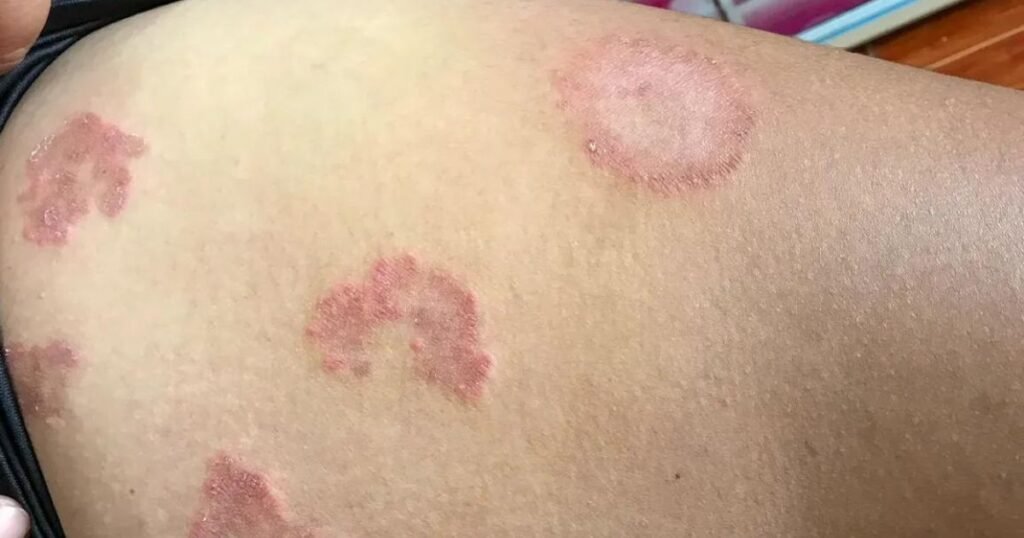Skin conditions are a common issue that affects people of all ages. They can range from mild, temporary conditions like acne to chronic, severe conditions like eczema. Understanding the causes and symptoms of different skin conditions can help individuals take the necessary steps to prevent and treat them.
Acne is a common skin condition that affects many people, particularly during adolescence. It is caused by the overproduction of oil in the skin, which can clog pores and lead to the formation of pimples, blackheads, and whiteheads. Acne can be treated with over-the-counter medications, such as salicylic acid or benzoyl peroxide, or with prescription medications like antibiotics or retinoids.
Eczema is another common skin condition that is characterized by red, itchy, and dry skin. It can be caused by a variety of factors, including genetics, allergies, and irritants. Eczema can be treated with moisturizers, anti-inflammatory creams, and oral medications.
Psoriasis is a chronic skin condition that is characterized by red, scaly patches on the skin. It is believed to be caused by an immune system problem and can be treated with medications, such as topical creams, light therapy, and oral medications.

Rosacea is a chronic skin condition that causes redness and visible blood vessels on the face. It can also cause pimples and a burning or stinging sensation. Rosacea can be treated with topical and oral medications, as well as lifestyle changes such as avoiding triggers like alcohol and spicy foods.
Read More: Are Popcorners Healthy
Skin cancer is the most serious skin condition and is caused by prolonged exposure to ultraviolet (UV) rays from the sun or tanning beds. There are three main types of skin cancer: basal cell carcinoma, squamous cell carcinoma, and melanoma. It can be treated with surgery, radiation therapy, and topical medications.
In conclusion, skin conditions can range from mild to severe, but there are many treatments available to help manage them. It is important to protect your skin from sun damage and to see a dermatologist if you notice any changes in your skin. Early detection and treatment can prevent skin conditions from becoming more severe and can improve overall skin health.
1. Introduction: The Significance of Skin Health
The skin is not just an outer covering; it serves as a vital shield against harmful environmental factors, pathogens, and ultraviolet (UV) radiation. It regulates body temperature, aids in vitamin D synthesis, and provides sensory perception. Skin conditions can significantly impact a person’s quality of life, causing physical discomfort, emotional distress, and even affecting self-esteem. Therefore, it is crucial to understand and address these issues promptly and effectively.
2. Acne: Dealing with the Most Common Skin Condition
Acne is a prevalent skin condition that affects millions of people worldwide, especially during adolescence. It occurs when hair follicles become clogged with oil, dead skin cells, and bacteria. The resulting symptoms include pimples, blackheads, whiteheads, and sometimes painful cysts or nodules. Effective treatments range from topical creams to oral medications, aiming to reduce oil production, unclog pores, and manage inflammation [2].
3. Eczema: Managing Dry and Itchy Skin
Eczema, also known as atopic dermatitis, is a chronic condition characterized by dry, itchy, and inflamed skin. It often begins in childhood and may persist into adulthood. The exact cause of eczema remains unknown, but it is believed to involve a combination of genetic and environmental factors. Treatment focuses on moisturizing the skin, avoiding triggers, and using medications to reduce inflammation and relieve itching.
4. Psoriasis: Understanding Chronic Inflammatory Skin Disorder

Psoriasis is a chronic autoimmune disease that affects the skin cells’ life cycle, leading to the rapid buildup of cells on the surface. This results in thick, red patches covered with silvery scales. Psoriasis can cause discomfort, pain, and self-consciousness. Although there is no cure, various treatments, including topical medications, phototherapy, and systemic medications, can effectively manage the symptoms and provide relief.
5. Rosacea: Unveiling the Mystery behind Facial Redness
Rosacea is a common skin condition characterized by facial redness, visible blood vessels, and sometimes small red bumps resembling acne. It primarily affects individuals with fair skin. While the exact cause of rosacea is unknown, triggers such as sun exposure, certain foods, alcohol, and stress can exacerbate the condition. Dermatologists can prescribe topical or oral medications, along with lifestyle modifications, to manage rosacea effectively.
Table of Contents
6. Dermatitis: Identifying and Treating Skin Irritation
Dermatitis refers to inflammation of the skin resulting from contact with irritants or allergens. It can cause redness, itching, and a rash-like appearance. Common forms of dermatitis include contact dermatitis, seborrheic dermatitis, and nummular dermatitis. Treatment involves avoiding triggers, applying topical corticosteroids or emollients, and implementing good skincare practices.
7. Hives: Exploring the Causes of Itchy Welts
Hives, also known as urticaria, are raised, itchy welts on the skin that occur due to an allergic reaction. They can be triggered by various factors, including medications, foods, insect bites, or infections. Hives typically resolve on their own within a few hours or days. Antihistamines may be recommended to alleviate symptoms and provide relief.

8. Melasma: Understanding Hyperpigmentation and Its Triggers
Melasma is a common skin condition characterized by dark patches or irregular pigmentation, primarily on the face. It predominantly affects women, especially during pregnancy or while taking hormonal contraceptives. Sun exposure and hormonal changes are key triggers. Treatment options include topical creams, chemical peels, and laser therapy, with strict sun protection being crucial for managing the condition effectively.
9. Skin Cancer: Detecting and Preventing Malignant Growths
Skin cancer is the abnormal growth of skin cells, usually triggered by excessive UV exposure. It is the most common type of cancer globally, with three major types: basal cell carcinoma, squamous cell carcinoma, and melanoma. Early detection and prevention are vital. Regular self-examinations, dermatologist screenings, and sun protection measures such as sunscreen and protective clothing can significantly reduce the risk.
10. Vitiligo: Embracing the Beauty of Skin Diversity
Vitiligo is a long-term condition characterized by the loss of skin pigment, leading to white patches on various parts of the body. It occurs when the cells responsible for producing melanin, the pigment that gives color to the skin, are destroyed. While there is no cure, treatments like topical corticosteroids, depigmentation, and phototherapy can help manage the condition and even out skin tone.
11. Cold Sores: Managing Painful Blisters
Cold sores, also known as fever blisters, are caused by the herpes simplex virus (HSV-1). They appear as small, fluid-filled blisters on or around the lips, often accompanied by tingling or burning sensations. Cold sores are contagious and can be triggered by stress, sun exposure, or a weakened immune system. Antiviral medications and topical creams can help reduce symptoms and promote healing.

12. Actinic Keratosis: Recognizing and Treating Precancerous Skin Lesions
Actinic keratosis is a rough, scaly patch of skin that develops from years of sun exposure. While typically harmless, it has the potential to progress to skin cancer if left untreated. Treatment options range from topical medications to cryotherapy or surgical removal, depending on the severity of the lesions.
13. Eczema: Nurturing the Skin Barrier
Eczema, also known as atopic dermatitis, is a chronic condition characterized by dry, itchy, and inflamed skin. It often starts in childhood and can persist into adulthood. Triggers include irritants, allergens, stress, and climate changes. Moisturizers, topical corticosteroids, and immunomodulators are commonly prescribed to manage eczema and relieve symptoms.
14. Psoriasis: The Battle against Rapid Skin Cell Growth
Psoriasis is a chronic autoimmune condition that causes the rapid buildup of skin cells, resulting in thick, red patches covered with silvery scales. It can affect any part of the body, including the scalp, nails, and joints. Treatment options range from topical medications to systemic therapies and phototherapy. Lifestyle modifications, such as stress reduction and avoiding triggers, can also help manage psoriasis effectively.
15. Acne: Unveiling the Truth behind Breakouts
Acne is a common skin condition that occurs when hair follicles become clogged with oil and dead skin cells. It can manifest as whiteheads, blackheads, pimples, or cysts and is often associated with hormonal changes during puberty. Treatment options include topical creams, oral medications, and lifestyle modifications, such as maintaining a consistent skincare routine and avoiding excessive oil production.
Conclusion
Skin conditions can significantly impact an individual’s quality of life, causing discomfort, self-consciousness, and even pain. It is essential to understand common skin conditions, their causes, and available treatment options. Dermatologists play a crucial role in diagnosing and managing these conditions, helping individuals achieve healthier skin and improved well-being.
FAQs about Skin Conditions

1. Are skin conditions contagious?
Some skin conditions, such as cold sores and certain types of rashes, can be contagious. It is important to take appropriate precautions and practice good hygiene to prevent the spread of contagious skin conditions.
2. Can stress worsen skin conditions?
Yes, stress can worsen certain skin conditions, including acne, eczema, and psoriasis. Managing stress through relaxation techniques, exercise, and a healthy lifestyle can help alleviate symptoms.
3. Are there any natural remedies for skin conditions?
While natural remedies may provide temporary relief for some skin conditions, it is crucial to consult a dermatologist for an accurate diagnosis and appropriate treatment. Dermatologists can recommend evidence-based therapies tailored to individual needs.
4. Can diet affect skin conditions?
In some cases, diet can influence skin conditions. For example, certain foods high in sugar or dairy products may exacerbate acne in some individuals. Maintaining a balanced diet and identifying personal triggers can help manage skin conditions effectively.
5. When should I see a dermatologist for a skin condition?
It is advisable to consult a dermatologist if you experience persistent or worsening skin symptoms, have concerns about a mole or growth, or need guidance on skincare and prevention. A dermatologist can provide expert diagnosis, treatment, and ongoing management for various skin conditions.





